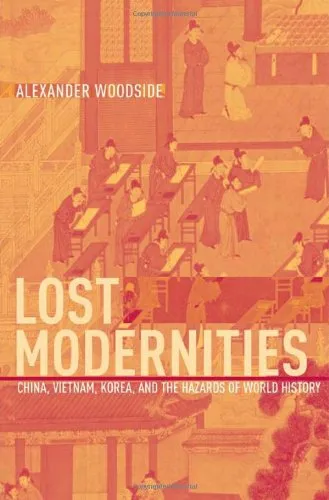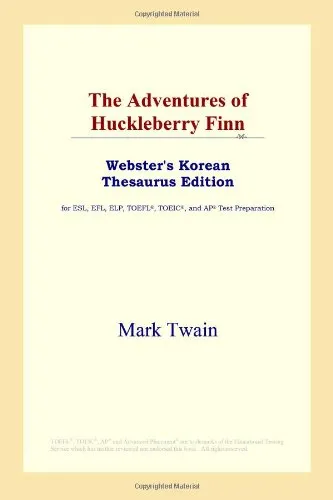Lost Modernities: China, Vietnam, Korea, and the Hazards of World History (The Edwin O. Reischauer Lectures)
4.0
بر اساس نظر کاربران

شما میتونید سوالاتتون در باره کتاب رو از هوش مصنوعیش بعد از ورود بپرسید
هر دانلود یا پرسش از هوش مصنوعی 2 امتیاز لازم دارد، برای بدست آوردن امتیاز رایگان، به صفحه ی راهنمای امتیازات سر بزنید و یک سری کار ارزشمند انجام بدینکتاب های مرتبط:
خلاصهای جامع از کتاب
کتاب 'Lost Modernities: China, Vietnam, Korea, and the Hazards of World History' نوشتهٔ الکساندر وودساید، نگاهی عمیق و مقایسهای به تاریخچهٔ تجربیات مدرنیزاسیون در سه کشور چین، ویتنام و کره دارد. این کتاب به بررسی ساختارهایی میپردازد که ممکن است به عنوان پیشروهای مدرنیته دیده شوند و به تحلیلی دقیق از چگونگی تأثیر این ساختارها بر توسعهٔ جوامع آسیای شرقی میپردازد. از طریق این بررسی، وودساید سعی دارد مفاهیمی جدید دربارهٔ تاریخهای جایگزین و خطرات تاریخ جهان را ارائه کند.
نکات کلیدی
- تحلیل شرایط تاریخی چین، ویتنام و کره به عنوان مدلهایی متفاوت از مدرنیزاسیون قبل از غربیسازی
- بررسی عناصری مانند سیستمهای بوروکراتیک، ساختارهای حکومتی و تاثیرات فرهنگی بر مدرنیته
- جستجو در چگونگی تأثیر قدرتهای بیرونی و رویدادهای جهانی بر فرآیندهای بومی مدرنیزاسیون
اقتباسهای معروف از کتاب
"تاریخ همیشه به صورت خطی حرکت نمیکند و مدرنیته نیز ممکن است در اشکال متفاوت و در نقاط مختلف جهان ظهور کند."
"شنوا و فهمایی که میگوید هیچ ملتی، هیچ سیستم حکومتی، و هیچ فرهنگی به خودی خود مدرن نیست، بلکه تنها در تعامل و تبادل با دیگران میتواند این ویژگی را یافته و تعریف کند."
چرا این کتاب اهمیت دارد؟
کتاب 'Lost Modernities' به دلیل رویکرد چندجانبه و مقایسهای خود نسبت به مدرنیزاسیون در جوامع آسیای شرقی دارای اهمیت است. الکساندر وودساید با استفاده از تحلیلهای دقیق و تاریخی بر روی سه کشور مختلف، به سوالات مهمی درباره سفر تاریخی این جوامع به سمت مدرنیته پاسخ میدهد. اهمیت کتاب در نحوه بررسی و تحلیل ساختارها و روندهایی است که ممکن است در نگاه اول جاافتاده باشند. این کتاب همچنین به خوانندگان کمک میکند تا نگاهی تازه به تاریخ و چالشهای جهانی آن داشته باشند.
Introduction to Lost Modernities: China, Vietnam, Korea, and the Hazards of World History
"Lost Modernities: China, Vietnam, Korea, and the Hazards of World History" by Alexander Woodside offers a compelling examination of the overlooked trajectories of modernization in East Asian civilizations. The book focuses on historical developments in China, Vietnam, and Korea, and argues that conventional western narratives of modernization often miss the complexities and contributions of these cultures. Throughout this insightful work, Woodside encourages readers to rethink world history and recognize the multifaceted nature of progress across different societies.
Detailed Summary of the Book
In "Lost Modernities," Alexander Woodside challenges the Eurocentric view of world history by highlighting the underappreciated developmental paths of East Asian societies. The book provides a detailed investigation into the historical and cultural contexts of China, Vietnam, and Korea, and examines how these regions have approached modernization independently of Western influences. Woodside delivers a nuanced analysis that uncovers how these civilizations developed complex governmental systems, legal codes, and philosophical doctrines that can be considered early forms of modernity.
The author contends that the historiography of modernization has traditionally undervalued the contributions and historical significance of East Asian societies. By exploring the unique characteristics and historical milestones of each region, Woodside reveals how they negotiated their own paths toward modernity, often preceding or paralleling similar developments in the West. China's bureaucratic governance, Vietnam's public policy evolution, and Korea's systems of societal organization are meticulously explored to demonstrate their advanced approaches to social and political challenges.
Key Takeaways
- The concept of modernity is not exclusive to the Western world; it has multiple manifestations across different cultures.
- East Asian civilizations developed sophisticated governance, legal, and philosophical systems that contributed to their unique paths to modernity.
- The study of history should embrace diverse narratives, acknowledging non-Western contributions to global development.
- The recognition of East Asia's historical achievements encourages a re-evaluation of modern global dynamics and the interconnectedness of cultures.
Famous Quotes from the Book
"The linear path to modernity depicted by Western history fails to account for the complex realities of East Asian development."
"By examining the nuanced evolutions in China, Vietnam, and Korea, we find that modernity wears many faces, each shaped by local realities."
Why This Book Matters
"Lost Modernities" is significant not only for its corrective approach to the Eurocentric model of history but also for its timing and relevance in today's globalized world. As international relations and global histories become increasingly intertwined, Woodside's work serves as a critical reminder of the importance of inclusive historical narratives. By understanding the distinct paths taken by China, Vietnam, and Korea towards modernity, readers gain a deeper appreciation of their cultural contributions and socio-political advancements. This recognition helps to foster mutual respect and understanding in contemporary global discourse.
Moreover, this book stands as a crucial resource for historians, scholars, and anyone interested in world history from an equity-driven perspective. It invites a reconsideration of traditional historical education and encourages a broader scope of study, which is vital for anyone seeking a comprehensive understanding of modern developments that shape our world.
دانلود رایگان مستقیم
You Can Download this book after Login
دسترسی به کتابها از طریق پلتفرمهای قانونی و کتابخانههای عمومی نه تنها از حقوق نویسندگان و ناشران حمایت میکند، بلکه به پایداری فرهنگ کتابخوانی نیز کمک میرساند. پیش از دانلود، لحظهای به بررسی این گزینهها فکر کنید.
این کتاب رو در پلتفرم های دیگه ببینید
WorldCat به شما کمک میکنه تا کتاب ها رو در کتابخانه های سراسر دنیا پیدا کنید
امتیازها، نظرات تخصصی و صحبت ها درباره کتاب را در Goodreads ببینید
کتابهای کمیاب یا دست دوم را در AbeBooks پیدا کنید و بخرید
1238
بازدید4.0
امتیاز50
نظر98%
رضایتنظرات:
4.0
بر اساس 0 نظر کاربران
"کیفیت چاپ عالی بود، خیلی راضیام"



